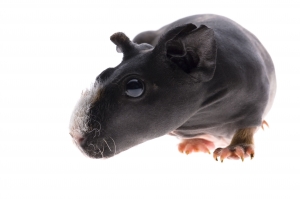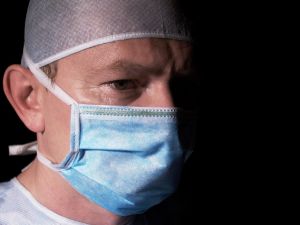Note: I’d prepared this article for the first week of December. With today’s news, about the death of ghost researcher Sara Harris, I’ve decided to publish it early.
Her story wasn’t the first I’ve heard about ghost researchers contracting respiratory infections after investigations, but it is among the worst. Her widower, Shane Harris, has started the Sara Harris Foundation. It will help to educate paranormal investigators about issues of health and safety, and provide masks and first aid kits to ghost hunting teams that can’t afford them. Shane says, “I have 3M on board to donate masks as soon as I get the tax ID number. My Paypal account is under saraharrisfoundation@yahoo.com, if you can help our cause.”
In addition, a follow-up article at Paranormal Insider includes even more reasons for concern among ghost hunters.
My article barely brushes the surface of the problem, but — in the interest of getting this information to more people, immediately — I’ve decided to publish it early. (Also listen to my related podcast, published early.)

 Among ghost hunters, I’ve been hearing some really scary stories. They’re not about the ghosts. They’re about health and safety issues.
Among ghost hunters, I’ve been hearing some really scary stories. They’re not about the ghosts. They’re about health and safety issues.
This is especially important during the winter, when we’re often investigating indoor locations. Energy-saving measures — such as doors and windows with weatherstripping, and storm doors and windows — mean less air circulation. The air isn’t as healthy, especially when someone has “indoor allergies” or environmental sensitivities.
Basements and attics often present safety issues. In at least one case this year, an otherwise healthy investigator was hospitalized with a life-threatening respiratory complaint, after conducting research at a site with rodent droppings.
With recent reports of ghost investigators becoming ill with life-threatening respiratory issues — and with the death of Sara Harris — we all need to be more aware of the dusty places we visit when we’re looking for ghosts.
You’re probably going to be in the dark, anyway. Why not wear a mask if there are any reasons to be concerned?
A ten-cent paper mask can help protect your health, reduce your chances of an allergic reaction or asthma, and — in extreme cases — might save your life. Get a box for yourself, or your team, and carry some masks with you, no matter where you’re investigating.
Depending on your health concerns, and the environments where you’re researching, stronger protection may be necessary if biological hazards are a very real issue.
However, for the casual researcher visiting sites that may contain irritants, allergens, and significant dust, the basic mask is one that protects you from 2-micron size particles or smaller. Inexpensive surgical masks are the simplest option, but be sure to read the labels.
Read more at http://hollowhill.com/ghost-hunting-health-and-safety-issues
Her story wasn’t the first I’ve heard about ghost researchers contracting respiratory infections after investigations, but it is among the worst. Her widower, Shane Harris, has started the Sara Harris Foundation. It will help to educate paranormal investigators about issues of health and safety, and provide masks and first aid kits to ghost hunting teams that can’t afford them. Shane says, “I have 3M on board to donate masks as soon as I get the tax ID number. My Paypal account is under saraharrisfoundation@yahoo.com, if you can help our cause.”
In addition, a follow-up article at Paranormal Insider includes even more reasons for concern among ghost hunters.
My article barely brushes the surface of the problem, but — in the interest of getting this information to more people, immediately — I’ve decided to publish it early. (Also listen to my related podcast, published early.)
 Among ghost hunters, I’ve been hearing some really scary stories. They’re not about the ghosts. They’re about health and safety issues.
Among ghost hunters, I’ve been hearing some really scary stories. They’re not about the ghosts. They’re about health and safety issues.This is especially important during the winter, when we’re often investigating indoor locations. Energy-saving measures — such as doors and windows with weatherstripping, and storm doors and windows — mean less air circulation. The air isn’t as healthy, especially when someone has “indoor allergies” or environmental sensitivities.
- Many researchers don’t take allergy medications before an investigation, especially if those medications might affect their alertness. That can put them more at risk for respiratory distress.
- Sometimes, a client blames physical phenomena — like dizziness or depression in just one part of the home or business — on ghosts when the actual issue is something environmental, like allergies, off-gassing from new wall-t0-wall carpeting, or oil-based wall paint with high VOCs. That’s going to affect some investigators on the scene, as well.
- Are you or team members allergic to pets? Ask the site owner if he or she has animals in the home or business. Since people often isolate their pets before an investigation team arrives, it’s a mistake to assume that there are no pets, just because you don’t see or hear them.
Basements and attics often present safety issues. In at least one case this year, an otherwise healthy investigator was hospitalized with a life-threatening respiratory complaint, after conducting research at a site with rodent droppings.
- Structural issues – Attic floorboards can be old and unable to support much weight. Ask the owner before you venture up there.
- Dust in attics isn’t just an issue when you’re trying to take credible orb photos. It’s also an allergen for many people.
- Basements are prone to mold and mildew. Against cement or stone walls, the problems may not be obvious until someone starts wheezing.
- In cities and warm climates where cockroaches are a steady problem, remember that it’s not always the insects but their droppings that present the worst respiratory challenges for people with allergies.
- Histoplasmosis – Bat droppings can put you at risk. It’s not just “bats in the belfry,” but bats (and sometimes birds) in the attic and the basement. Histoplasmosis can be a serious respiratory disease and a significant threat in some areas. As it says at Bats and Rabies, “To be safe, avoid breathing dust in areas where there are animal droppings… wear a respirator that can guard against particles as small as two microns.“ Every researcher should have — at the very least — a few simple, paper masks in his or her ghost hunting kit. (However, not all blue medical masks protect at the level you need. Read the label!)
- If you’re exploring a haunted cave (such as the Bell Witch cave), a mask is an especially good idea, if you’re subject to respiratory issues.
- Investigating an abandoned hospital? Some people worry about visiting old tuberculosis hospitals; they’re usually called sanitoriums. Generally, TB can only be spread from human to human, and only when the contagious person has an active case of the disease. However, some doctors are now saying that tuberculosis “is spread usually from person to person by breathing infected air during close contact.” (Emphasis added.) Should you wear a mask in dusty, abandoned hospitals? Probably, but not because of TB. At deserted sites, there’s a greater potential for disease-containing animal and insect droppings.
With recent reports of ghost investigators becoming ill with life-threatening respiratory issues — and with the death of Sara Harris — we all need to be more aware of the dusty places we visit when we’re looking for ghosts.
You’re probably going to be in the dark, anyway. Why not wear a mask if there are any reasons to be concerned?
A ten-cent paper mask can help protect your health, reduce your chances of an allergic reaction or asthma, and — in extreme cases — might save your life. Get a box for yourself, or your team, and carry some masks with you, no matter where you’re investigating.
Depending on your health concerns, and the environments where you’re researching, stronger protection may be necessary if biological hazards are a very real issue.
However, for the casual researcher visiting sites that may contain irritants, allergens, and significant dust, the basic mask is one that protects you from 2-micron size particles or smaller. Inexpensive surgical masks are the simplest option, but be sure to read the labels.
Read more at http://hollowhill.com/ghost-hunting-health-and-safety-issues

Hi! Interesting post and even catchy TOPIC to write on! I liked it! I also have in my native town a place supposed to be inhabited by a ghost!
ReplyDeleteBTW, You know what?! I would like to come with such idea, it will be up to you to decide to agree to it or not! I am working at a German publishing company who is eager to publish for FREE interesting and useful content-blogs like yours! I think all these pieces of advice/experiences are worthy to become the CONTENT of a BOOK!
So, if you are interested in my idea, please let me know by a message at my work email: a.doyle@bloggingbooks.de
Warmly,
Adrian
http://bloggingbooks.net/